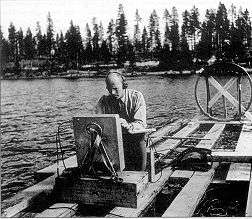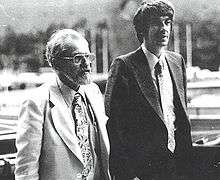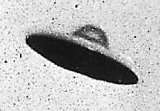Ufology
Ufology (/juːˈfɒlədʒi/) is the investigation of unidentified flying objects (UFOs) by people who believe that they may be of extraordinary origins (most famously, extraterrestrial alien visitors).[1][2] While there are instances of government, private, and fringe science investigations of UFOs, ufology is regarded by skeptics and science educators as a canonical example of pseudoscience.
Etymology
Ufology derives from UFO (a term apparently coined by Edward J. Ruppelt),[3] and is pronounced as an acronym with the appended suffix -logy (from the Ancient Greek λογία (logiā)). Early uses of ufology include an article in Fantastic Universe (1957)[4] and a 1958 presentation for the UFO "research organization" The Planetary Center.[5]
Historical background

The roots of ufology include the "mystery airships" of the late 1890s, the "foo fighters" reported by Allied airmen during World War II, the "ghost fliers" of Europe and North America during the 1930s, the "ghost rockets" of Scandinavia (mostly Sweden) in 1946, and the Kenneth Arnold "flying saucer" sighting of 1947.[6][7] Media attention to the Arnold sighting helped publicize the concept of flying saucers.[8]
Publicity of UFOs increased after World War II, coinciding with the escalation of the Cold War and strategic concerns related to the development and detection (e.g., the Ground Observer Corps) of advanced Soviet aircraft.[6][9][10] Official, government-sponsored activities in the United States related to ufology ended in the late 1960s following the Condon Committee report and the termination of Project Blue Book.[11] Government-sponsored, UFO-related activiites in other countries, including the United Kingdom,[12][13] Canada,[14] Denmark,[15] Italy,[16] and Sweden[17] also ended. An exception to this trend is France, which maintains the GEIPAN[18] program, formerly known as GEPAN (1977–1988) and SEPRA (1988–2004), operated by the French Space Agency CNES.
Status as a field
Pseudoscience
Despite investigations sponsored by governments and private entities, ufology is not embraced by academia as a scientific field of study, and is instead considered a pseudoscience by skeptics and science educators,[19] being often included on lists of topics characterized as pseudoscience as either a partial[20] or total[21][22] pseudoscience.[23][24][25][26][27][28] Pseudoscience is a term that classifies arguments that are claimed to exemplify the methods and principles of science, but do not in fact adhere to an appropriate scientific method, lack supporting evidence, plausibility, falsifiability, or otherwise lack scientific status.[29] Some writers have identified social factors that contribute to the status of ufology as a pseudoscience.[30][31][32]
Methodological issues
Although some ufologists (e.g., Peter A. Sturrock) have proposed explicit methodological activities for investigation of UFOs,[33] scientific UFO research is challenged by the facts that the phenomena are spatially and temporally unpredictable, are not reproducible, and lack tangible physicality.[34][35] That most UFO sightings have mundane explanations[36] limits interpretive power of "interesting," extra-ordinary UFO-related events, with the astronomer Carl Sagan writing: "The reliable cases are uninteresting and the interesting cases are unreliable. Unfortunately there are no cases that are both reliable and interesting."[37]

The ufologists J. Allen Hynek and Jacques Vallée have each developed descriptive systems for characterizing UFO sightings, and by extension for organizing ufology investigations.[38][39][40]
Phenomena linked to ufology
In addition to UFO sightings, certain supposedly related phenomena are of interest to some ufologists, including crop circles,[41] cattle mutilations,[42] and alien abductions and implants.[43] Some ufologists have also promoted UFO conspiracy theories, including the alleged Roswell UFO Incident of 1947,[44][45][46] the Majestic 12 documents,[47] and UFO disclosure advocates.[48][49]
Skeptic Robert Sheaffer has accused ufology of having a "credulity explosion,"[50] writing that, "the kind of stories generating excitement and attention in any given year would have been rejected by mainstream ufologists a few years earlier for being too outlandish."[50] The physicist James E. McDonald also identified "cultism" and "extreme...subgroups" as negatively impacting ufology.[51]
In Trotskyism
During the Cold War, ufology was synthesized with the ideas of a Trotskyist movement in South America known as Posadism. Posadism's main theorist, Juan Posadas, believed the human race must "appeal to the beings on other planets...to intervene and collaborate with Earth’s inhabitants in suppressing poverty;" i.e., Posadas wished to collaborate with extraterrestrials in order to create a Socialist system on Earth.[52] The adoption of this belief among Posadists, who had previously been a significant political force in South America, has been noted as a contributing factor in their decline.[53]
Governmental and private ufology studies
Starting in the 1940s, investigations, studies, and conferences related to ufology were sponsored by governmental agencies and private groups. Typically motivated by visual UFO sightings, the goals of these studies included critical evaluation of the observational evidence, attempts to resolve and identify the observed events, and the development of policy recommendations. These studies include Project Sign, Project Magnet, Project Blue Book, the Robertson Panel, and the Condon Committee in the United States, the Flying Saucer Working Party and Project Condign in Britain, GEIPAN in France, and Project Hessdalen in Norway. Private studies of UFO phenomena include those produced by the RAND Corporation in 1968,[54] Harvey Rutledge of the University of Missouri from 1973-1980,[55][56] and the National Press Club's Disclosure Project in 2001.[57][58][59] Additionally, the United Nations from 1977-1979 sponsored meetings and hearings concerning UFO sightings.[60][61]
UFO organizations and events
A large number of private organizations dedicated to the study, discussion, and publicity of ufology and other UFO-related topics exist throughout the world, including the United States, the United Kingdom, Australia, and Switzerland. Along with such "pro-UFO" groups are skeptic organizations that emphasize the pseudoscientific nature of ufology.
During the annual World UFO Day (July 2), ufologists and associated organizations raise public awareness of ufology, in an effort to "tell the truth about earthly visits from outer space aliens."[62][63] The day's events include group gatherings to search for and observe UFOs.[64][65]
See also
References
- Blake, Joseph A. (2015-05-27). "Ufology: The Intellectual Development and Social Context of the Study of Unidentified Flying Objects:". The Sociological Review. doi:10.1111/j.1467-954x.1979.tb00067.x. ISSN 1467-954X.
- Restivo, Sal P. (2005). Science, technology, and society: an encyclopedia. Oxford University Press US. p. 176. ISBN 0-19-514193-8.
- Ruppelt, Edward (2007). The Report On Unidentified Flying Objects. Charleston, South Carolina: BiblioBazaar. ISBN 978-1434609168.
- Sanderson, Ivan T. "An Introduction to Ufology." Fantastic Universe. Feb. 1957: 27-34. Print.
- Adam. "Challenge of UFOs - Part II Chapter VII". www.nicap.org. Retrieved 2017-11-12.
- Brake, Mark (June 2006). "On the plurality of inhabited worlds;a brief history of extraterrestrialism". International Journal of Astrobiology. 5 (2): 104. Bibcode:2006IJAsB...5...99B. doi:10.1017/S1473550406002989.
- Denzler, Brenda (2003). The lure of the edge: scientific passions, religious beliefs, and the pursuit of UFOs. University of California Press. pp. 6–7. ISBN 0-520-23905-9.
- Denzler (2003), p. 9
- Schulgen, George (October 28, 1947). "Schulgen Memo". Retrieved May 3, 2010.
- "The Air Force Intelligence Report". Retrieved May 3, 2010.
- Haines, Gerald K. (April 14, 2007). "CIA's Role in the Study of UFOs, 1947-90". Retrieved May 3, 2010.
- "UFOs". nationalarchives.gov.uk.
- "UFO reports to be destroyed in future by MoD". Telegraph. London. February 28, 2010. Retrieved May 3, 2010.
- "Archived – Canada's UFOs: The Search for the Unknown – Library and Archives Canada – Archive 蒃 – Le phénomène des ovnis au Canada – Bibliothèque et Archives Canada". collectionscanada.gc.ca.
- "Secret UFO archives opened". The Copenhagen Post. January 29, 2009. Retrieved May 3, 2010.
- Italian Air Force UFO site (in Italian)
- "För insyn: 18 000 svenska UFO-rapporter". Expressen (in Swedish). May 6, 2009. Retrieved May 3, 2010.
- GEIPAN stands for Groupe d'Études et d'Informations sur les Phénomènes Aérospatiaux Non-identifiés ("unidentified aerospace phenomenon research and information group")
- Moldwin, Mark (November 2004). "Why SETI IS Science and UFOlogy Is Not: A Space Science Perspective on Boundaries". Skeptical Inquirer. Vol. 28 (No. 6): 40–42.
- Tuomela, Raimo (1985). Science, action, and reality. Springer. p. 234. ISBN 90-277-2098-3.
- Feist, Gregory J. (2006). The psychology of science and the origins of the scientific mind. Yale University Press. p. 219. ISBN 0-300-11074-X.
- Restivo, Sal P. (2005). Science, technology, and society: an encyclopedia. Oxford University Press US. p. 176. ISBN 0-19-514193-8.
- Shermer, Michael, ed. (2002). The Skeptic Encyclopedia of Pseudoscience (PDF). ABC–CLIO, Inc. ISBN 978-1-57607-653-8. Retrieved 16 December 2013.CS1 maint: ref=harv (link)
- ""Beyond Science", on season 8, episode 2". Scientific American Frontiers. Chedd-Angier Production Company. 1997–1998. PBS. Archived from the original on 2006.
- "Scientific American". Archived from the original on 9 October 2009.CS1 maint: ref=harv (link)
- Fraknoi, Andrew (October 2009). "The 'Great Moon Hoax': Did Astronauts Land on the Moon?". Astronomical Pseudo-Science: A Skeptic's Resource List. Astronomical Society of the Pacific. Retrieved 2 November 2011.CS1 maint: ref=harv (link)
- "Statement of the position of the Iowa Academy of Science on Pseudoscience" (PDF). Iowa Academy of Science. July 1986. Archived from the original (PDF) on 26 June 2007.CS1 maint: ref=harv (link)
- National Science Foundation (2002). "ch. 7". Science and Engineering Indicators. Arlington, VA: National Science Foundation. ISBN 978-0-7567-2369-9. Archived from the original on 16 June 2016. Retrieved 6 April 2018.
Belief in pseudoscience is relatively widespread... A sizable minority of the public believes in UFOs and that aliens have landed on Earth.
CS1 maint: ref=harv (link) - Hansson, Sven Ove (September 3, 2008). "Science and Pseudo-Science". Retrieved May 8, 2010.
- Feist (2006), pp. 219–20
- Eghigian, Greg (2015-12-06). "Making UFOs make sense: Ufology, science, and the history of their mutual mistrust:". Public Understanding of Science. doi:10.1177/0963662515617706.
- Cooper, Rachel (2009). "Chapter 1: Is psychiatric research scientific?". In Broome, Matthew; Bortolotti, Lisa (eds.). Psychiatry as Cognitive Neuroscience: Philosophical Perspectives. Oxford University Press. p. 19. ISBN 978-0-19-923803-3.
- Sturrock (2000) p. 163
- Denzler (2003), p. 35
- Hoyt, Diana Palmer (2000-04-20). "UFOCRITIQUE: UFO's, Social Intelligence and the Condon Committees" (PDF). Master's Thesis. Virginia Polytechnic Institute: 13. Archived from the original (PDF) on 2007-03-17. Retrieved 2007-05-25. Cite journal requires
|journal=(help) - Markovsky B., "UFOs", in The Skeptic's Encyclopedia of Pseudoscience, edited by Michael Shermer, 2002 Skeptics Society, p260
- Sagan, Carl (1975). Other Worlds. Bantam. p. 113. ISBN 0-552-66439-1.
- Hynek, J. Allen (1974). The UFO experience: a scientific enquiry. Corgi. ISBN 0-552-09430-7.
- Tumminia, Diana G. (2007). Alien worlds: social and religious dimensions of extraterrestrial contact. Syracuse University Press. ISBN 0-8156-0858-6.
- Vallée, Jacques F. (1998). "Physical Analyses in Ten Cases of Unexplained Aerial Objects with Material Samples". Journal of Scientific Exploration. 12 (3): 360–61.
- Andrews, Colin; Spignesi, Stephen J. (2003). Crop circles: signs of contact. Career Press. ISBN 1-56414-674-X.
- Howe, Linda Moulton (1989). Alien Harvest: Further Evidence Linking Animal Mutilations and Human Abductions to Alien Life Forms. Linda Moulton Howe Productions. ISBN 0-9620570-1-0.
- Denzler (2003), p. 239
- Dunning, Brian. "Skeptoid #79: Aliens in Roswell". Skeptoid. Retrieved 27 December 2016.
- Friedman, Stanton T.; Berliner, Don (1992). Crash at Corona: The U.S. Military Retrieval and Cover-up of a UFO. Paragon House. ISBN 1-55778-449-3.
- Randle, Kevin D.; Schmitt, Donald R. (1991). UFO Crash at Roswel. Avon Books. ISBN 0-380-76196-3.
- Friedman, Stanton T. (1997). TOP SECRET/MAJIC. Marlowe & Co. ISBN 1-56924-741-2.
- Salla, Michael (2004). Exopolitics: Political Implications of Extraterrestrial Presence. Dandelion Books. ISBN 1-893302-56-3.
- Greer, Steven M. (2001). Disclosure : Military and Government Witnesses Reveal the Greatest Secrets in Modern History. Crossing Point. ISBN 0-9673238-1-9.
- Sheaffer, Robert. "A Skeptical Perspective on UFO Abductions". In: Pritchard, Andrea & Pritchard, David E. & Mack, John E. & Kasey, Pam & Yapp, Claudia. Alien Discussions: Proceedings of the Abduction Study Conference. Cambridge: North Cambridge Press. pp. 382–88.
- McDonald (1968)
- "J. Posadas: Flying saucers ... and the socialist future of mankind (26 June 1968)". www.marxists.org. Retrieved 2019-09-12.
- John Sandor Steven (2006). Permanent Revolution on the Altiplano: Bolivian Trotskyism. Ann Arbor, Michigan: ProQuest Information and Learning Company, p. 314.
- Kocher, George (November 1968). "UFOs: What to Do?" (PDF). RAND Corporation. Retrieved May 8, 2010.
- Rutledge, Harley D. (1981). Project Identification: the first scientific field study of UFO phenomena. Prentice-Hall. ISBN 0-13-730705-5.
- Dickinson, Alexander K. (February 1982). "Interesting, But UFO's Still Unidentified". The Physics Teacher. 20 (2): 128–30. Bibcode:1982PhTea..20..128D. doi:10.1119/1.2340971.
- Katelynn Raymer (May 10, 2001). "Group Calls for Disclosure of UFO Info". ABC News. Retrieved May 5, 2010.
- Rob Watson (May 10, 2001). "UFO spotters slam 'US cover-up'". BBC News. Retrieved May 5, 2010.
- Sharon Kehnemui (May 10, 2001). "Men in Suits See Aliens as Part of Solution, Not Problem". Fox News. Retrieved May 5, 2010.
- A/DEC/32/424 UNBISnet- United Nations Bibliographic Information System, Dag Hammarskjöld Library (Retrieved May 4, 2010)
- A/DEC/33/426, UNBISnet (Retrieved May 4, 2010)
- "July 2: World UFO Day, the Real U.S. Independence Day, I Forgot Day, Violin Lover's Day and Freedom from Fear of Public Speaking Day". Yahoo News. 26 June 2012. Retrieved 2012-06-26.
- "Organisations & Groups supporting / celebrating World UFO day". World UFO Day Website. 10 October 2012. Retrieved 2012-10-08.
- "Can you answer the UFO questions?". BBC News. 2 July 2003. Retrieved 2003-07-02.
- "Out of This World, Out of Our Minds". New York Times. 3 July 2010. Retrieved 2010-07-03.
Further reading
- Academic books about ufology as a sociological and historical phenomenon
- Denzler, Brenda (2003). The lure of the edge: scientific passions, religious beliefs, and the pursuit of UFOs. University of California Press. ISBN 0-520-23905-9.
- Pro-ufology
- Hynek, J. Allen (1998). The UFO experience: a scientific inquiry. Da Capo Press. ISBN 1-56924-782-X.
- Vallée, Jacques F. (1991). Confrontations: A Scientist's Search for Alien Contact. Random House Value Publishing. ISBN 0-517-07204-1.
- Skeptical opinions
- Klass, Philip J. (1983). UFOs: the public deceived. Prometheus Books. ISBN 0-87975-322-6.
- Sheaffer, Robert (1986). The UFO verdict: examining the evidence. Prometheus Books. ISBN 0-87975-338-2.
- Ufology studies
- Gillmor, Daniel S.; Condon, Edward U. (1970). Scientific Study of Unidentified Flying Objects. Vision. ISBN 0-85478-142-0.
- Rutledge, Harley D. (1981). Project Identification: the first scientific field study of UFO phenomena. Prentice-Hall. ISBN 0-13-730705-5.
